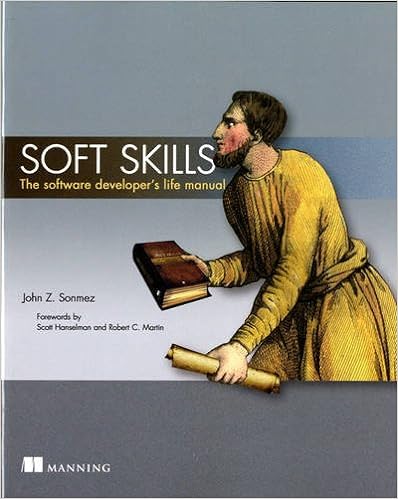Soft Skills: The Software Developer's Life Manual

Soft Skills: The Software Developer's Life Manual by John Z. Sonmez
Purchasing items linked to by the article give the site a small affiliate reward and helps us keep the lights on.
The Book
Soft Skills is a book for software developers that isn't about software development. This book fills in the gaps in life skill training that the University curriculum did not cover.
He discusses how to manage your career - how to interview, how to prepare a resume, how to market yourself, how to improve your ability to learn and take in new information, how to experiment with new technologies, how to improve your productivity.
A lot of the material in the Career section has been covered in other books such as The Passionate Programmer and Land the Tech Job You Love, which will be upcoming reviews, but the section is still somewhat useful. I ate up the section on marketing yourself. It's easy to just post your resume and hope that a headhunter finds you. Instead, create a twitter account, use github, contribute to OSS, speak at conferences, write publication, etc. to become known in the Software Development world. The resources can boost your credibility with prospective employers and clients much more than a 2 page resume. I agree. In fact, that is one reason I create the Gears of Geek site!
The section on Learning was okay but a bit abstract, and mostly common sense. For the most part, those were really the sections I was expecting from the book honestly, based on the title. I figured the book would mostly be about enriching the skills that help you thrive at work, that's typically what I consider "soft skills" at the office. I expected some stuff about navigating corporate ladders or even communicating with coworkers but there really wasn't much of that. I expected the career/marketing/learning stuff as well.
He discusses managing personal finance - how to budget, how to invest, how to get into real estate. He favors creating income in retirement by starting businesses over socking money away in a company 401k plan. If you're a software engineer, you owe it to yourself to at least read this section. It's about salary negotiation, investing, stock options, debt management, retirement plans, and more. These are things that I always wished I knew more about, but it's not taught in school and the internet is rife with scams rather than useful information on these topics. It's weird because it's always tough to ask about this sort of thing at work - people somehow expect everyone to understand 401k's and stock options, and folks are weirdly cagey about giving advice/help on these matters. The chapter on Stock Options was the first thing that finally made the subject make sense to me, and there's two sections in the Appendix about money and stock markets that are required reading as well.
The section on productivity was great, with lots of useful tips for how to be more productive. I like how he attacked procrastination, which is one of my weaknesses. I'm always busy but the undesirable work might get delayed. He discusses ideas on how to track progress by maintaining a daily work log. The work log also comes in handy during performance reviews. He touches on popular productivity strategies such as the Pomodoro technique and Dave Allen's Getting Things Done Method.
He covers how to stay in physical shape to take care of your health and be competitive in the dating market. The Fitness section was great, containing good solid advice contained therein. There are also two more appendix sections on nutrition and fitness that are phenomenal. They were better than the entirety of O'Reilly's Fitness for Geeks book.
Despite all of this great material, there are a few chapters that are skippable. The final section, "Spirit" is fluff. "Real Estate" is overly simplified and glosses over the pitfalls usually encountered while trying to rent a property.
The Final Word
Overall, the book is pretty well-written and conversational. Information is delivered in small, consumable chunks. Each chapter is generally only a few pages long so it's easy to read over a series of short sessions. The Audible narration is top-notch and contains editorial comments that update the expand on the original book's content.
I found the book an extremely valuable source of ideas and perspectives on not only career, but life skills. I highly recommend this book to software developers, particularly the section on Finances and, if you've never seen it in another book, the sections on Career and Marketing Yourself.
You can get the book from Amazon by click on the links in this article.